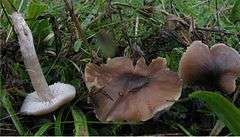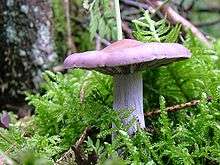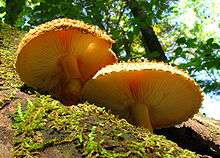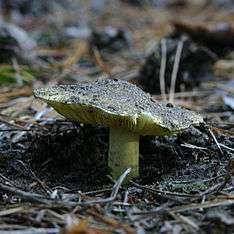List of Tricholomataceae genera
The Tricholomataceae are a family of fungi in the Agaricales order. A 2008 estimate placed 78 genera and 1020 species in the family.[1] In 2014, Sánchez-García and colleagues proposed a revised classification of the Tricholomataceae with seven genera: Leucopaxillus, Tricholoma, Dennisiomyces, Porpoloma, and the newly circumscribed genera Corneriella, Pogonoloma and Pseudotricholoma.[2]
Genera
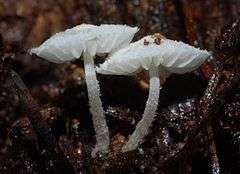
Amparoina spinosissima
A young Catathelasma imperiale
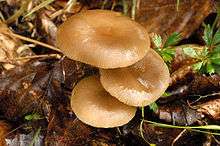
Fayodia pseudoclusilis
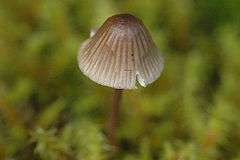
Mycenella bryophila

Omphalina griseopallida
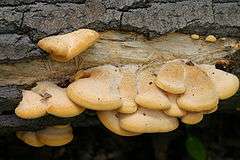
Phyllotopsis nidulans
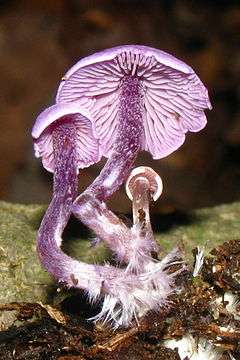
Pseudobaeospora sp.
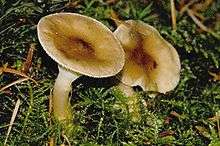
Pseudoomphalina pachyphylla
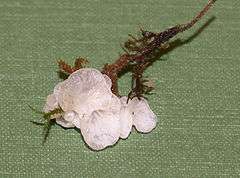
Rimbachia bryophila
| Genus | Year | Type species | # of species | Distribution |
|---|---|---|---|---|
| Amparoina Singer[3] |
1958 | Amparoina spinosissima (Singer) Singer |
2 | South America |
| †Archaeomarasmius Hibbett et al. |
1997 | Archaeomarasmius leggetti Hibbett et al. |
1 | Extinct, Turonian New Jersey amber |
| Arthromyces T.J.Baroni & Lodge[4] |
2007 | Arthromyces claviformis T.J.Baroni & Lodge |
2 | Central America |
| Arthrosporella[N 1] Singer[5] |
1970 | Arthrosporella ditopa (Singer) Singer |
1 | Argentina |
| Asproinocybe R.Heim[6] |
1970 | Asproinocybe lactifera R.Heim |
5 | Africa (tropical) |
| Austroclitocybe Raithelh.[7] |
1972 | Austroclitocybe veronicae Raithelh. |
1 | South America (temperate) |
| Austroomphaliaster Garrido[8] |
1988 | Austroomphaliaster nahuelbutensis Garrido |
1 | South America (temperate) |
| Callistodermatium Singer[9] |
1981 | Callistodermatium violascens Singer |
1 | Brazil |
| Callistosporium Singer[10] |
1944 | Callistosporium palmarum (Murrill) Singer |
13 | widespread |
| Cantharellopsis Kuyper[11] |
1986 | Cantharellopsis prescotii (Weinm.) Kuyper |
1 | Europe |
| Catathelasma Lovejoy[12] |
1910 | Catathelasma evanescens Lovejoy |
4 | widespread (north temperate) |
| Caulorhiza Lennox[13] |
1979 | Caulorhiza umbonata (Peck) Lennox |
3 | USA |
| Cellypha Donk[14] |
1959 | Cellypha goldbachii (Weinm.) Donk |
10 | widespread |
| Clavomphalia E.Horak[15] |
1987 | Clavomphalia yunnanensis E.Horak |
1 | China |
| Clitocybe (Fr.) Staude[16] |
1857 | Clitocybe nebularis (Batsch) P.Kumm. |
300 (approx.) | widespread (esp. north temperate) |
| Collybia (Fr.) Staude[16] |
1857 | Collybia tuberosa Fr. |
3 | widespread (north temperate) |
| Conchomyces Overeem[17] |
1927 | Conchomyces verrucisporus Overeem |
2 | Indonesia |
| Cynema Maas Geest. & E.Horak[18] |
1995 | Cynema alutacea Maas Geest. & E.Horak |
1 | Papua New Guinea |
| Cyphellocalathus Agerer[19] |
1981 | Cyphellocalathus cecropiae (Singer) Agerer |
1 | widespread |
| Delicatula Fayod[20] |
1889 | Delicatula integrella (Pers.:Fr.) Pat. |
2 | widespread (temperate) |
| Dendrocollybia R.H.Petersen & Redhead[21] |
2001 | Dendrocollybia racemosa (Pers.) R.H.Petersen & Redhead |
1 | widespread (temperate) |
| Dennisiomyces Singer[22] |
1955 | Dennisiomyces glabrescentipes Singer |
5 | South America |
| Dermoloma (J.E.Lange) Singer ex Herink[23] |
1959 | Dermoloma cuneifolium (Fr.) Singer |
15 (approx.) | widespread |
| Fayodia Kühner[24] |
1930 | Fayodia bisphaerigera (J.E.Lange) Kühner |
10 (approx.) | widespread (north temperate) |
| Gamundia Raithelh.[25] |
1979 | Gamundia striatula Joss. & Konrad |
6 | Europe, South America (temperate) |
| Hygroaster Singer[26] |
1955 | Hygroaster nodulisporus (Dennis) Singer |
2 | America (tropical) |
| Infundibulicybe Harmaja[27] |
2003 | Infundibulicybe geotropa (Bull.) Harmaja |
13 | widespread |
| Lepista (Fr.) W.G.Sm.[28] |
1870 | Lepista panaeolus (Fr.) P.Karst. |
50 (approx.) | widespread |
| Lepistella T.J.Baroni & Ovrebo[29] |
2007 | Lepistella ocula T.J.Baroni & Ovrebo |
1 | Central America |
| Leucocortinarius (J.E.Lange) Singer[30] |
1945 | Leucocortinarius bulbiger (Alb. & Schwein.) Singer |
1 | Europe |
| Leucoinocybe Singer[31] |
1943 | Leucoinocybe lenta (Maire) Singer |
1 | Europe |
| Leucopaxillus Boursier[32] |
1925 | Leucopaxillus paradoxus (Costantin & L.M.Dufour) Boursier |
15 (approx.) | Europe |
| Leucopholiota (Romagn.) O.K.Mill. et al.[33] |
1996 | Leucopholiota decorosa (Peck) O.K.Mill. et al. |
1 | USA |
| Lulesia Singer[5] |
1970 | Lulesia densifolia (Singer) Singer |
3 | tropical |
| Macrocybe Pegler & Lodge[34] |
1998 | Macrocybe titans (H.E.Bigelow & Kimbr.) Pegler et al. |
7 | widespread (tropics) |
| Melanoleuca Pat.[35] |
1897 | Melanoleuca vulgaris[N 2] (Pat.) Pat. |
50 (approx.) | widespread |
| Melanomphalia M.P.Christ.[36] |
1936 | Melanomphalia nigrescens M.P.Christ. |
1 | Europe |
| Musumecia Vizzini & Contu |
2011 | Musumecia bettlachensis Vizzini & Contu |
1 | Europe |
| Mycenella (J.E.Lange) Singer[37] |
1938 | Mycenella cyatheae (Singer) Singer |
10 | widespread (temperate) |
| Mycoalvimia Singer[9] |
1981 | Mycoalvimia theobromicola Singer |
1 | Brazil |
| Myxomphalia Hora[38] |
1960 | Myxomphalia maura (Fr.) Hora |
4 | widespread (north temperate) |
| Neoclitocybe Singer[39] |
1962 ("1961")[N 3] |
Neoclitocybe byssiseda (Bres.) Singer |
10 | widespread (esp. tropical) |
| Nothoclavulina[N 1] Singer[5] |
1970 | Nothoclavulina ditopa Singer |
1 | Argentina |
| Omphaliaster Lamoure[40] |
1971 | Omphaliaster borealis (M.Lange & Skifte) Lamoure |
7 | widespread (north temperate) |
| Omphalina Quél.[41] |
1886 | Omphalina pyxidata (Bull.) Quél. |
50 (approx.) | widespread (esp. temperate) |
| Paralepista Raithelh.[42] |
1981 | Paralepista inversa (Fr.) Raithelh. |
12 | widespread |
| Paralepistopsis Vizzini[42] |
2012 | Paralepistopsis amoenolens (Malençon) Vizzini |
2 | North Africa, southern and southwestern Europe, Asia |
| Peglerochaete Sarwal & Locq.[43] |
1983 | Peglerochaete setiger Sarwal & Locq. |
1 | Sikkim |
| Pegleromyces Singer[9] |
1981 | Pegleromyces collybioides Singer |
1 | Brazil |
| Phaeomycena R.Heim ex Singer & Digilio[44] |
1952 ("1951") |
Phaeomycena aureophylla R.Heim |
5 | Africa, Asia |
| Phyllotopsis E.-J.Gilbert & Donk ex Singer[45] |
1936 | Phyllotopsis nidulans (Pers.) Singer |
5 | widespread (temperate) |
| Physocystidium Singer[46] |
1962 | Physocystidium cinnamomeum (Dennis) Singer |
1 | Trinidad |
| Pleurella E.Horak[47] |
1971 | Pleurella ardesiaca (G.Stev. & G.M.Taylor) E.Horak |
1 | New Zealand |
| Pleurocollybia Singer[48] |
1947 | Pleurocollybia praemultifolia (Murrill) Singer |
5 | America, Asia |
| Porpoloma Singer[49] |
1952 | Porpoloma sejunctum Singer |
12 (approx.) | South America |
| Pseudobaeospora Singer[50] |
1942 | Pseudobaeospora oligophylla Singer |
20 (approx.) | widespread |
| Pseudoclitocybe (Singer) Singer[51] |
1956 | Pseudoclitocybe cyathiformis (Bull.) Singer |
10 | widespread (north temperate; South America) |
| Pseudohygrophorus Velen.[52] |
1939 | Pseudohygrophorus vesicarius Velen. |
1 | Europe |
| Pseudolaccaria Vizzini, Contu & Z.W. Ge[53] |
1939 | Pseudolaccaria pachyphylla (Fr.) Vizzini & Contu |
1 | Europe |
| Pseudolasiobolus Agerer[54] |
1983 | Pseudolasiobolus minutissimus Agerer |
1 | tropical |
| Pseudoomphalina (Singer) Singer[51] |
1956 | Pseudoomphalina kalchbrenneri (Bres.) Singer |
6 | widespread (temperate) |
| Resupinatus Nees ex Gray[55] |
1821 | Resupinatus applicatus (Batsch) Gray |
20 (approx.) | widespread |
| Rimbachia Pat.[56] |
1891 | Rimbachia paradoxa Pat. |
10 (approx.) | widespread (tropical) |
| Ripartites P.Karst[57] |
1879 | Ripartites tricholoma (Alb. & Schwein.) P.Karst. |
5 (approx.) | widespread |
| Squamanita Imbach[58] |
1946 | Squamanita schreieri Imbach |
10 | widespread |
| Stanglomyces Raithelh.[59] |
1986 ("1985") |
Stanglomyces taxophilus Raithelh. |
1 | South America |
| Tilachlidiopsis Keissl.[60] |
1924 | Tilachlidiopsis racemosa Keissl. |
1 | widespread (north temperate) |
| Tricholoma (Fr.) Staude[16] |
1857 | Tricholoma equestre (L.) P.Kumm. |
200 (approx.) | widespread (esp. north temperate) |
| Tricholomopsis Singer[61] |
1939 | Tricholomopsis rutilans (Schaeff.) Singer |
30 (approx.) | widespread |
| Tricholosporum Guzmán[62] |
1975 | Tricholosporum goniospermum (Bres.) Guzmán |
12+ | Northern hemisphere, South Africa, Central America |
Notes and references
- Notes
- References
- ↑ Kirk PM, Cannon PF, Minter DW, Stalpers JA (2008). Dictionary of the Fungi (10th ed.). Wallingford, UK: CAB International. p. 700. ISBN 0-85199-826-7.
- ↑ Sánchez-García M, Matheny PB, Gotz DJ (2014). "Deconstructing the Tricholomataceae (Agaricales) and introduction of the new genera Albomagister, Corneriella, Pogonolomaand Pseudotricholoma". Taxon. 63 (5): 993–1007. doi:10.12705/635.635.3.
- ↑ Singer R. (1958). "New genera of fungi. VIII. Notes concerning the sections of the genus Marasmius Fr.". Mycologia. 50 (1): 103–10. doi:10.2307/3756041.
- ↑ Baroni TJ, Franco-Molano AE, Lodge DJ, Lindner DL, Horak E, Hofstetter V (2007). "Arthromyces and Blastosporella, two new genera of conidia-producing lyophylloid agarics (Agaricales, Basidiomycota) from the neotropics" (PDF). Mycological Research. 111 (5): 572–80. doi:10.1016/j.mycres.2007.03.007. PMID 17572336.
- 1 2 3 Singer R. (1970). "Omphalinae, Clitocybeae - Tricholomataceae. Basidiomycetes". Flora Neotropica. 3: 17–18. JSTOR 4393664.
- ↑ Heim R. (1969). "Breves diagnoses latinae novitatum genericarum specificarumque nuper descriptarum". Revue de Mycologie. 34 (4): 343–47. ISSN 0484-8578.
- ↑ Raithelhuber J. (1972). "Lateinische Kurzdiagnosen der auf der Dreiländertagung in Neubulach vorgestellten Pilzarten aus Argentinien. 2". Metrodiana (in German). 3 (1): 27–29.
- ↑ Garrido N. (1988). Agaricales s. l. und ihre Mykorrhizen in den Nothofagus-Wäldern Mittelchiles. Bibliotheca Mycologica 120 (in German). Berlin: Cramer. p. 199. ISBN 3-443-59021-7.
- 1 2 3 Singer R. (1981). "New Genera of Agaricales". Mycologia. 73 (3): 500–10. doi:10.2307/3759603.
- ↑ Singer R. (1944). "New genera of fungi". Mycologia. 36 (4): 358–68. doi:10.2307/3754752.
- ↑ Kuyper TW. (1986). "Generic delimitation in European omphalinoid Tricholomataceae". La Famiglia delle Tricholomataceae, Atti del Convegno Internazionale de 10–15 settembre 1984. Atti del Centro Studi per la Fora Mediterranea, 6 (in Italian). pp. 83–104.
- ↑ Lovejoy RH. (1910). "Some New saprophytic fungi of the middle Rocky Mountain region". Botanical Gazette. 50 (5): 383–85. doi:10.1086/330381. JSTOR 2467339.
- ↑ Lennox JW. (1979). "Collybioid genera in the Pacific Northwest". Mycotaxon. 9 (1): 117–231. Retrieved 2009-12-01.
- ↑ Donk MA. (1959). "Notes on Cyphellaceae: 1". Persoonia. 1 (1): 25–110.
- ↑ Horak E. (1987). "Agaricales from Yunnan China I". Nippon Kingakukai Kaiho (Transactions of the Mycological Society of Japan). 28 (2): 171–88. ISSN 0029-0289.
- 1 2 3 Staude F. (1857). Die Schwämme Mitteldeutschlands, in besondere des Herzogthums: xxviii (in German). Coburg. pp. 119, 122, 127.
- ↑ van Overeem C. (1927). "Zwamen". In K. Heyne. De nuttige planten van Nederlandsch Indië, vol. 1 (2nd ed.). Buitenzorg: Departement van Landbouw, Nijverheid & Handel in Nederlandsch-Indië. pp. 62–84.
- ↑ Petrini O, Horak E., ed. (1995). Taxonomic Monographs of Agaricales. Bibliotheca Mycologica 159. Berlin: Cramer. p. 159. ISBN 3-443-59061-6.
- ↑ Agerer R. (1981). "Contribution to neotropical cyphellaceous fungi: III. The new genus Cyphellocalathus". Mycologia. 73 (3): 486–92. doi:10.2307/3759601.
- ↑ Fayod V. (1889). "Prodrome d'une histoire naturelle des Agaricinés". Annales des sciences naturelles septième série. Botanique. (in French). 9: 181–411. Retrieved 2009-11-29.
- ↑ Hughes KW, Petersen RH, Johnson JE, Moncalvo JM, Vilgalys R, Redhead SA, Thomas T, McGhee LL (2001). "Infragenic phylogeny of Collybia s. str. based on sequences of ribosomal ITS and LSU regions". Mycological Research. 105 (2): 164–72. doi:10.1017/S0953756200003415.
- ↑ Singer R. (1955). "New species of Agaricales from Pernambuco". Anais da Sociedade de Biologia de Pernambuco. 13: 225–33.
- ↑ Herink J. (1958). "Štavnatkovité houby parhorku "Velká Horka" u Mnichova Hradište". Sborník Severoceskeho Musea, Prírodní Vedy (in Czech). 1: 53–86.
- ↑ Kühner R. (1930). "Un nouveau groupe d'Agarics leucosporés". Bulletin de la Société Linnéenne de Lyon (in French). 9: 67–72.
- ↑ Raithelhuber J. (1979). "Calocybe Kühner – eine Sammelgattung?". Metrodiana (in German). 8 (2–3): 9–10.
- ↑ Singer R. (1955). "Type studies on Basidiomycetes VIII". Sydowia. 9 (1–6): 367–431.
- ↑ Harmaja H. (2003). "Notes on Clitocybe s. lato (Agaricales)." (PDF). Annales Botanici Fennici. 40 (3): 213–18. Retrieved 2009-11-29.
- ↑ Smith WG. (1870). "Clavis Agaricinorum". Journal of Botany, British and Foreign. 8: 246–52.
- ↑ Ovrebo CL, Baroni TJ (2007). "New taxa of Tricholomataceae and Entolomataceae (Agaricales) from Central America" (PDF). Fungal Diversity. 27 (1): 157–70. Retrieved 2009-11-27.
- ↑ Singer R. (1945). "New genera of fungi. II". Lloydia. 8: 139–44.
- ↑ Singer R. (1943). "Das System der Agaricales. III". Annales Mycologici. 41: 1–189.
- ↑ Boursier J. (1925). "Leucopaxillus nov. gen.". Bulletin Trimestriel de la Société Mycologique de France. 41 (1): 391–93.
- ↑ Miller OK, Volk TJ, Bessette AE (1996). "A new genus, Leucopholiota, in the Tricholomataceae (Agaricales) to accommodate an unusual taxon" (PDF). Mycologia. 88 (1): 137–39. doi:10.2307/3760794.
- ↑ Pegler DN, Lodge DJ, Nakasone KK (1998). "The pantropical genus Macrocybe gen. nov.". Mycologia. 90 (3): 494–504. doi:10.2307/3761408.
- ↑ Patouillard N. (1897). Catalogue raisonné des plantes cellulaires de la Tunisie (in French). Paris: Imprimerie Nationale. p. 22.
- ↑ Christiansen MP. (1936). "Melanomphalia n. g. Ny slægt indefor de mørksporede Bladhatte". Friesia (in Danish). 1 (5): 287–89.
- ↑ Singer R. (1938). "De nonnullis Basidiomycetibus. I". Botanicheskie Materialy Otdela Sporovyh Rastenij Botanicheskogo Instituti Imeni V.L. Komarova. 4 (10–12): 4–18.
- ↑ Hora FB. (1960). "New check list of British agarics and boletiPart IV. Validations, new species and critical notes". Transactions of the British Mycological Society. 43 (2): 440–59. doi:10.1016/S0007-1536(60)80067-8.
- ↑ Singer R. (1961). "Diagnoses fungorum novorum Agaricalium II". Sydowia. 15 (1–6): 45–83.
- ↑ Lamoure D. (1971). "Agaricales de la zone alpine. Rhodocybe borealis Lange & Skifte, et sa position systematique". Svensk botanisk Tidskrift (in French). 65 (3): 278–82.
- ↑ Quélet L. (1887). Enchiridion fungorum in Europa media et praesertim in Gallia vigentium (in Latin). Paris: O. Doin. p. 42. Retrieved 2009-11-29.
- 1 2 Vizzini A, Ercole E (2012). "Paralepistopsis gen. nov. and Paralepista (Basidiomycota, Agaricales)". Mycotaxon. 120: 253–67. doi:10.5248/120.253.
- ↑ Sarwal BM, Locquin MV (1983). Comptes rendus du 108e Congrès national des sociétés savantes, Volume 2: Taxonomie, écologie, phyto-géographie, physiologie végétale, biologie animale (in French). p. 193. ISBN 2735500144.
- ↑ Singer R, Digilio AP (1951). "Pródromo de la Flora Agaricina Argentina". Lilloa (in Spanish). 25 (3): 5–461.
- ↑ Singer R. (1936). "Studien zur Systematik der Basidiomyceten. I". Beihefte zum Botanischen Zentralblatt (in German). 56: 137–56.
- ↑ Singer R. (1962). "New genera of fungi. VIII". Persoonia. 2 (3): 407–15.
- ↑ Horak E. (1971). "Contributions to the knowledge of the Agaricales s.l. (Fungi) of New Zealand". New Zealand Journal of Botany. 9: 463–93. doi:10.1080/0028825X.1971.10430194.
- ↑ Singer R. (1947). "New genera of fungi. III". Mycologia. 39 (1): 77–89. doi:10.2307/3755289. PMID 20283546.
- ↑ Singer R. (1952). "The agarics of the Argentine sector of Tierra del Fuego and limitrophous regions of the Magallanes area". Sydowia. 6 (1–4): 165–226.
- ↑ Singer R. (1942). "Type studies on agarics". Lloydia. 5: 97–135.
- 1 2 Singer R. (1956). "New genera of fungi. VII". Mycologia. 48 (5): 719–27. doi:10.2307/3755381.
- ↑ Velenovský J. (1939). Novitates mycologicae (in Latin). Prague: L. Souc̆ek. p. 28. OCLC 6325761.
- ↑ Vizzini, Alfredo; Ge, Zai-Wei (2015). [file:///C:/Users/Django/Downloads/Pseudolaccaria.pdf "Redescription of Clitocybe umbrinopurpurascens (Basidiomycota, Agaricales) and revision of Neohygrophorus and Pseudoomphalina"] Check
|url=value (help) (PDF). Phytotaxa. 219 (1): 43–57. - ↑ Agerer R. (1983). "Typusstudien an cyphelloiden Pilzen IV. Lachnellula Fr. s.l". Mitteilungen aus der Botanischen Staatssammlung, München (in German). 19: 164–334.
- ↑ Gray SF. (1821). A Natural Arrangement of British Plants. London: Baldwin, Cradock, and Joy. p. 617. Retrieved 2009-11-29.
- ↑ Patouillard NT, de Lagerheim G (1891). "Champignons de l'Equateur (Pugillus I)". Bulletin de la Société Mycologique de France (in French). 7: 158–84.
- ↑ Karsten PA. (1879). Rysslands, Finlands och den Skandinaviska halföns Hattsvampar. Förra Delen: Skifsvampar. Bidrag till Kännedom of Finlands Natur Folk. 32. Helsinki: Finska litteratur-sällskapets tryckeri. p. 477.
- ↑ Imbach EJ. (1946). "Pilzflora des Kantons Luzern und der angrenzen Innerschweiz". Mitteilungen der naturforschenden Gesellschaft Luzern (in German). 15: 5–85.
- ↑ Raithelhuber J. (1985). "Die Pilze des Höhenparks Killesberg (Stuttgart). 2 Teil". Metrodiana (in German). 14: 27–41.
- ↑ von Keissler K. (1924). "Schedae ad "Kryptogamas exsiccatas" editae a Museo historie naturalis Vindobonensi (olim Museum Palatinum)". Annalen des Naturhistorischen Museums in Wien (in German). 37: 201–206.
- ↑ Singer R. (1939). "Phylogenie und Taxonomie der Agaricales". Schweizerische Zeitschrift für Pilzkunde (in German). 17: 52–57.
- ↑ Guzmán G. (1975). "Un nuevo genero y dos nuevas especies de Agaricaceos Mexicanos" (PDF). Boletín de la Sociedad Mexicana de Micología (in Spanish). 9: 61–66.
See also
This article is issued from Wikipedia - version of the 6/2/2016. The text is available under the Creative Commons Attribution/Share Alike but additional terms may apply for the media files.
